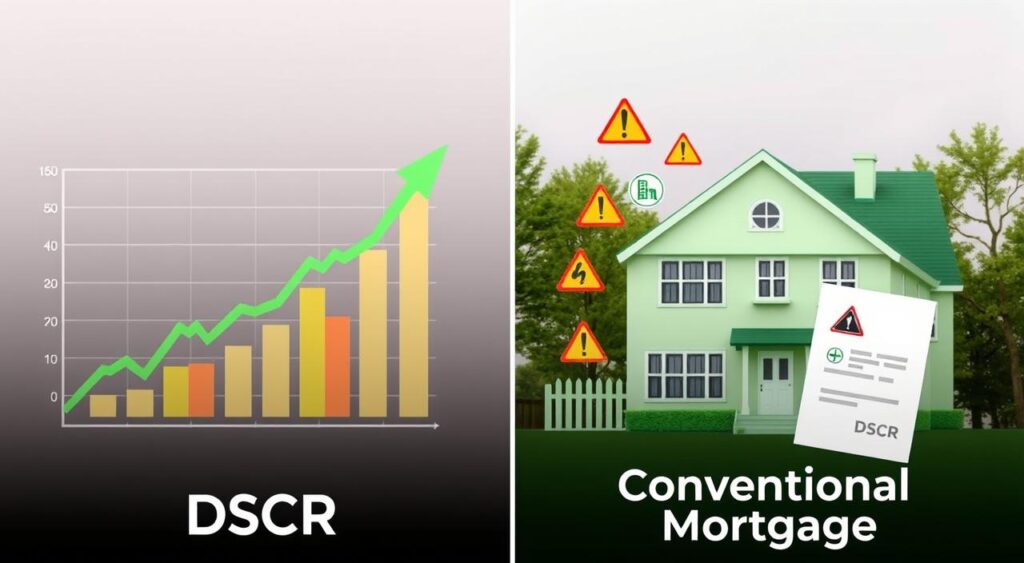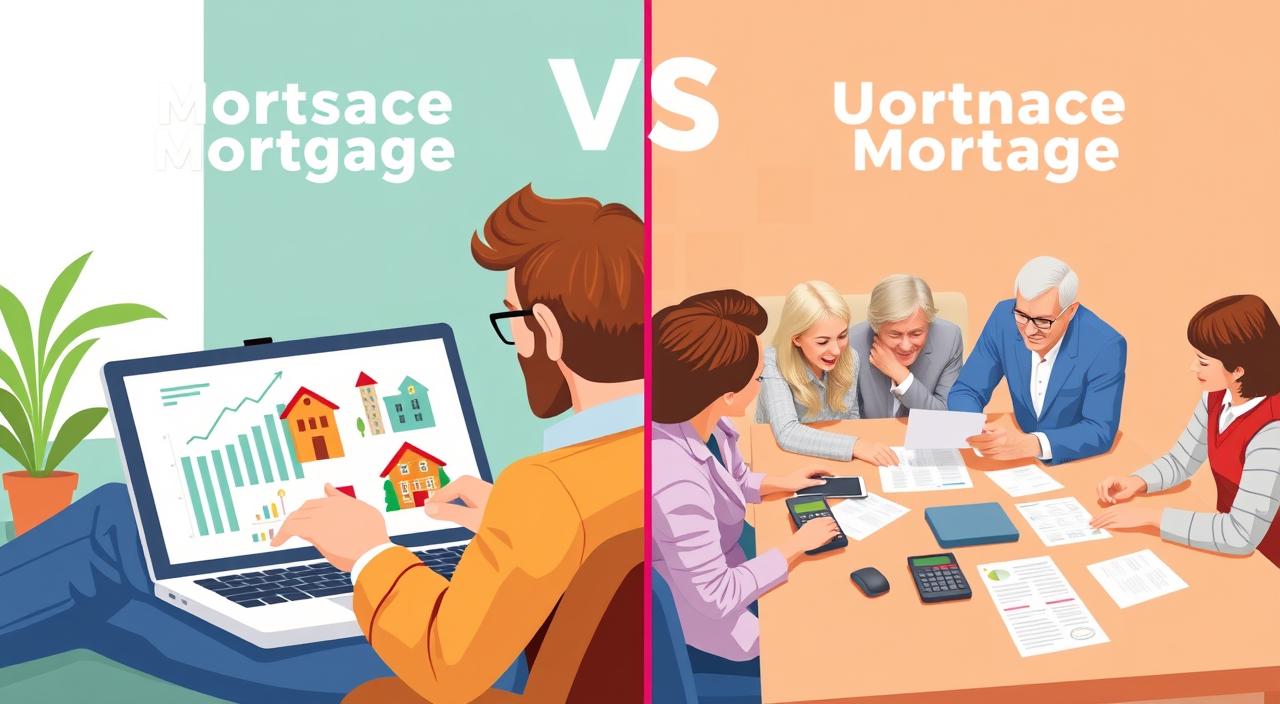More than 80% of real estate investors use mortgage financing for their income properties. Choosing between DSCR (Debt Service Coverage Ratio) and conventional mortgages is key. Knowing the differences between these options can greatly affect your investment strategy and financial success.
Key Takeaways
- DSCR mortgages focus on the property’s cash flow, offering flexible financing for real estate investors.
- Conventional mortgages have stricter criteria, like higher credit scores and income proof.
- Debt Service Coverage Ratio (DSCR) analysis is vital for checking a property’s profitability and risk.
- Lenders look at DSCR and conventional mortgages differently, considering your investment experience and financial profile.
- Understanding the differences between DSCR and conventional mortgages helps you pick the right financing for your real estate goals.
Understanding DSCR Mortgages
DSCR mortgages are getting more attention in real estate investing. DSCR stands for Debt Service Coverage Ratio. It’s a loan made for investors to buy income-producing properties.
What is a DSCR Mortgage?
A DSCR mortgage looks at the property’s cash flow, not the borrower’s income. This is great for investors who don’t have steady jobs or high incomes. But, their properties make a lot of money from rent.
Benefits of DSCR Mortgages
DSCR mortgages have many benefits for real estate investors:
- They’re perfect for investment properties like rentals and commercial spaces.
- They focus on the property’s cash flow, not just the borrower’s income.
- They have easier income requirements, making them more accessible.
- They often let you borrow more money, so you can buy more with less down.
Real estate investors can use DSCR mortgages to grow their portfolios. They help investors make the most of properties that bring in income.
| Key Characteristics | DSCR Mortgages | Conventional Mortgages |
|---|---|---|
| Underwriting Criteria | Based on the property’s cash flow | Based on the borrower’s personal income and credit |
| Income Documentation | Flexible, may not require traditional W-2 income | Strict, requires detailed income documentation |
| Loan-to-Value (LTV) Ratios | Potentially higher LTV ratios | Generally lower LTV ratios |
| Suitable for | Income-producing investment properties | Owner-occupied residential properties |
Conventional Mortgage Basics
Conventional mortgages are the most common choice for buying homes. They are used for homes where people live and meet certain rules set by Fannie Mae and Freddie Mac.
These mortgages have many benefits. They offer good interest rates, flexible payment plans, and can be used for different types of homes. To get one, you need to meet certain mortgage lending criteria. This includes a good credit score, a certain debt-to-income ratio, and a down payment.
| Loan Type | Property Type | Down Payment | Credit Score |
|---|---|---|---|
| Conventional Mortgage | Owner-occupied | 10-20% | 620+ |
A big plus of conventional mortgages is they work well for main homes and vacation homes. They’re not for investment properties, which need special loans like DSCR mortgages. Conventional mortgages are great for buying a home, offering a stable way to own a place.
“Conventional mortgages offer borrowers a predictable and well-understood path to homeownership, making them a popular choice for primary residences and second homes.”
Qualifying Criteria: DSCR vs Conventional
Borrowers have two main choices for mortgages: DSCR and conventional loans. Each has its own rules for qualifying. Knowing these differences helps you make a smart choice.
Income Documentation Requirements
DSCR and conventional mortgages ask for different income proof. DSCR loans focus on the property’s rental income. Lenders need financial statements and rent rolls to check the DSCR.
Conventional mortgages, however, look at your personal income. You’ll need to show pay stubs, W-2s, tax returns, and bank statements. This proves you can afford the mortgage.
Credit Score Requirements
The credit score rules for DSCR and conventional loans are different. DSCR mortgages often accept lower credit scores. This is because the lender looks at the property’s income, not your credit.
Conventional loans, though, need a higher credit score. Usually, it’s 620 or better. Better scores mean better loan terms and rates.
Knowing these criteria is key for borrowers to pick the right loan qualification. It depends on your financial situation and goals.
Debt Service Coverage Ratio: A Closer Look
The debt service coverage ratio (DSCR) is key in the mortgage underwriting process. It shows lenders how well an investment property can handle its debt. Knowing how to calculate and what DSCR ratios are ideal helps borrowers get the financing they need.
Calculating DSCR
DSCR is found by dividing the property’s net operating income (NOI) by its total debt service. This includes the mortgage payment and other debts. The formula is:
DSCR = Net Operating Income / Total Debt Service
This helps lenders see if the property can pay off its debts. They use this info to decide if they’ll approve the loan and what terms to offer.
Ideal DSCR Ratios
- A DSCR of 1.0 or more is usually the minimum lenders want. It means the property’s income can cover its debt.
- Lenders often prefer a DSCR between 1.15 and 1.35. This range shows a good balance for both the lender and borrower.
- Some lenders might like a DSCR over 1.35. This suggests even stronger cash flow and lower risk.
Remember, what DSCR is acceptable can change between lenders. So, borrowers should check the specific requirements for their DSCR mortgage application.

DSCR vs Conventional Mortgage
When looking to finance real estate, borrowers face a choice between DSCR and conventional mortgages. It’s important to know the differences to make the right choice for your needs and goals.
DSCR mortgages are for investors of income-generating properties like rental homes or commercial real estate. They check if the property can pay for the mortgage, not the borrower’s income. Conventional mortgages, however, are for homes where the borrower lives and focus more on their credit and financial situation.
| Feature | DSCR Mortgage | Conventional Mortgage |
|---|---|---|
| Loan Purpose | Investment properties | Owner-occupied properties |
| Income Documentation | Focused on property cash flow | Focused on borrower’s personal income |
| Credit Score Requirements | Typically lower than conventional | Generally higher than DSCR |
| Down Payment | Typically higher than conventional | Typically lower than DSCR |
Understanding DSCR and conventional mortgages helps borrowers choose wisely. This choice depends on your investment strategy, risk level, and financial situation. Knowing the pros and cons of each can guide you to the best financing for your needs.
“Choosing the right mortgage product can make a significant difference in the success of your real estate investment journey.”
Risk Assessment: DSCR vs Conventional
Lenders look at different risks when giving out mortgage loans. DSCR (Debt Service Coverage Ratio) mortgages and conventional mortgages have their own ways of being judged. This affects both the lender and the borrower.
Lender’s Perspective
For DSCR mortgages, lenders check if the property can pay for the loan. They look at the DSCR to make sure the property can handle the mortgage payments. But, conventional mortgages focus more on the borrower’s credit score and income documentation.
Borrower’s Perspective
The borrower’s view also changes. DSCR mortgages might attract investors who value cash flow over their credit history. Meanwhile, conventional mortgages might suit those with a strong financial profile, aiming to buy their primary home.
| Risk Assessment Factor | DSCR Mortgage | Conventional Mortgage |
|---|---|---|
| Focus | Property’s cash flow | Borrower’s personal creditworthiness |
| Key Evaluation Metric | Debt Service Coverage Ratio (DSCR) | Credit score, income documentation |
| Target Borrower | Investors prioritizing cash flow | Owner-occupants with strong personal finances |
Knowing how DSCR mortgages and conventional mortgages are judged can help borrowers make better choices. It helps them understand the mortgage world better.

Underwriting Guidelines Comparison
Getting a mortgage involves different rules for DSCR loans and conventional mortgages. It’s key to know these differences to navigate the loan process well.
DSCR Mortgage Underwriting
DSCR loans are for investment properties. They look at the property’s cash flow and mortgage payments, not the borrower’s income. Lenders check the underwriting guidelines, rental income, and DSCR ratio to decide if the loan works.
- Rental income is key, needing a DSCR of at least 1.0 to qualify.
- Credit score rules are more relaxed, with scores as low as 620 accepted.
- Loan-to-value (LTV) ratios vary from 70% to 80%, based on property and lender rules.
Conventional Mortgage Underwriting
Conventional mortgages focus on the borrower’s personal underwriting guidelines, income, and credit. Lenders look at debt-to-income (DTI) ratio, job history, and credit score to see if the borrower can repay the loan.
- Borrowers need a credit score of at least 620, with better scores getting better terms.
- DTI ratios should be under 43%, but some lenders might allow higher ratios.
- Loan-to-value (LTV) ratios for conventional conventional mortgage loans are 80% to 97%, based on down payment and other factors.
Knowing the details of these underwriting guidelines helps borrowers choose between DSCR and conventional mortgages for their loan qualification needs.
Loan Products and Options
Real estate investors have many loan options for DSCR mortgages and conventional mortgages. These solutions help investors meet their commercial real estate financing> and income property loans> needs.
For DSCR mortgages, investors can look at:
- Rental property loans
- Multi-family property financing
- Fix-and-flip loan programs
- Bridge loans for commercial real estate
Conventional mortgages also have many options, like:
- Jumbo loans for high-value properties
- FHA loans for owner-occupied homes
- VA loans for military members and veterans
- Refinancing options to unlock equity
Investors can find the right DSCR mortgage and conventional mortgage loans for their needs. Knowing the details of each loan helps investors make smart choices. This way, they can get the financing they need to reach their goals.
“Choosing the right loan product is crucial for real estate investors to maximize their returns and minimize their risks.”
Investment Property Financing Strategies
Real estate investors can use DSCR and conventional mortgages to boost their returns. Knowing the benefits of each can help you choose wisely. This choice should match your investment goals.
DSCR for Rental Properties
DSCR mortgages are great for rental property investors. They look at the property’s cash flow, not the borrower’s income. This is perfect for those with many rental properties, as it focuses on the property’s income.
Conventional for Owner-Occupied Properties
Conventional mortgages are best for those who will live in the property. You need to show you can pay the mortgage with your income. This is ideal for those who plan to live in the property or use it as a second home.
Using DSCR mortgages and conventional mortgages smartly can help investors reach their goals. Whether you’re renting out properties or occupying the investment property yourself, the right choice matters.
Alternative Lending Options
While DSCR mortgages and conventional mortgages are common, there are other options too. These alternatives offer flexibility and funding for investors who can’t get traditional loans. They might be a good choice for certain situations.
Hard Money Loans
Hard money loans are for short-term needs in investment property loans or commercial real estate financing. They use the property as collateral and are funded by private investors or lenders. This option is good for quick deals or when credit isn’t perfect.
Private Money Lenders
Private money lending is another choice. Private money lenders offer investment property loans outside of banks. They might be quicker and more flexible, but rates and fees can be higher.
- Hard money loans: Short-term, property-backed financing from private investors or specialized lenders
- Private money lending: Loan funding from individuals or organizations outside of traditional banks, often with flexible criteria
- Bridge loans: Short-term financing to bridge the gap between the sale of one property and the purchase of another
- Crowdfunding: Raising funds for real estate investments through online platforms and individual investors
These alternative lending options might not work for everyone. But they can offer extra flexibility and funding for commercial real estate financing or investment property loans. Investors should weigh the pros and cons to find the best option for their needs.
Conclusion
DSCR mortgages and conventional mortgages have their own benefits. They depend on your real estate investment plan and financial situation. Knowing the differences in mortgage rules helps you choose wisely for your goals.
DSCR mortgages are great for financing rental or investment properties. They focus on the property’s income, making it easier to qualify. On the other hand, conventional mortgages are better for homes you live in. They offer better terms and lower down payments for primary residences.
Knowing about real estate investment financing strategies and mortgage lending criteria is key. It helps you succeed in the real estate market. By looking at your options and getting advice from experts, you can make the best choice for your investment.
FAQ
What is the key difference between a DSCR mortgage and a conventional mortgage?
A DSCR mortgage looks at the property’s cash flow, not the borrower’s income. This is different from conventional mortgages, which focus on the borrower’s credit and financial health. DSCR mortgages check if the property can pay for itself, while conventional mortgages look at the borrower’s ability to pay.
What are the benefits of a DSCR mortgage?
DSCR mortgages are great for investment properties. They focus on the property’s cash flow, not the borrower’s income. This makes them a good choice for investors who can show the property can pay for itself.
What are the general loan requirements for a conventional mortgage?
Conventional mortgages need a higher credit score and lower debt-to-income ratio. They also require proof of personal income and assets. These loans are mainly for homes where the borrower lives, not for investment properties.
How do the income documentation requirements differ between DSCR and conventional mortgages?
DSCR mortgages look at the property’s cash flow, not the borrower’s income. Lenders check the property’s financial history to ensure it can pay for itself. Conventional mortgages, however, need detailed proof of the borrower’s income, like pay stubs and tax returns.
What is the Debt Service Coverage Ratio (DSCR) and how is it calculated?
The Debt Service Coverage Ratio (DSCR) is key for DSCR mortgages. It’s the property’s net operating income divided by its mortgage debt. Lenders want a DSCR of at least 1.25, showing the property can cover payments with extra money. A higher DSCR means less risk for lenders.
How do lenders assess the risk differently for DSCR and conventional mortgages?
Lenders see DSCR mortgages as less risky because they focus on the property’s cash flow. For conventional mortgages, they look at the borrower’s credit and income. This is because conventional mortgages are secured by the borrower’s home.
What are the key differences in the underwriting guidelines for DSCR and conventional mortgages?
DSCR mortgages focus on the property’s cash flow and the investment market. Conventional mortgages look at the borrower’s income and credit. The specific rules for each can vary, including credit scores, down payments, and loan-to-value ratios.
What are some alternative lending options for real estate investors besides DSCR and conventional mortgages?
Real estate investors have other options like hard money loans and private money lenders. These alternatives might offer more flexibility but often have higher rates or shorter terms. It’s important for investors to weigh the pros and cons to find the best option for their goals and finances.

